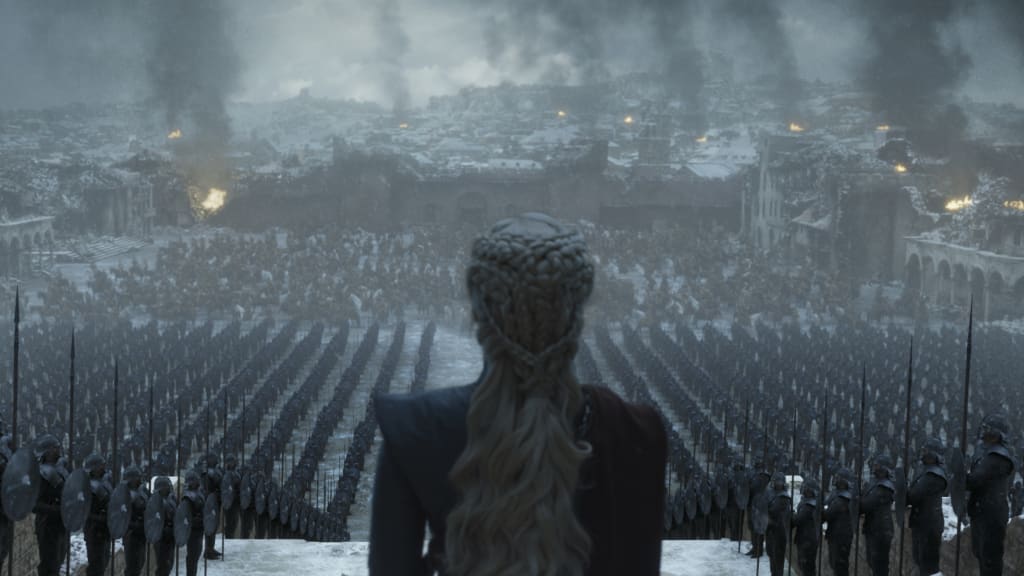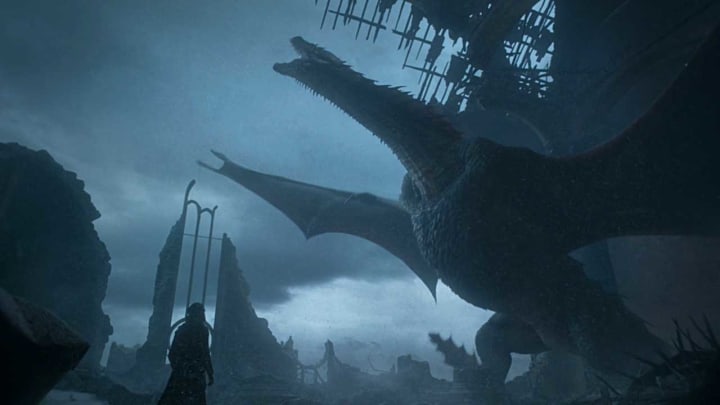Our Watch Has Ended
As 'Game Of Thrones' ends with a divisive finale, we look at why fans should be happy with the ending, and focus on the greater impact the iconic show has made.

Seventy-three episodes. Ten years. Eight Seasons. Four houses. Three Dragons. One Iron throne.
And now our watch has ended.
Game of Thrones has been a pop culture phenomenon, a unique blend of fantasy, myth, legends, brutality, and humanity. There has never been, and never will be, anything quite like it again. For eight straight seasons the world of Westeros has enraptured our imaginations, forced us to gasp in awe, and scream in shock. Like the Night’s Watch themselves, it has formed a community of avid viewers, determined to make all the pieces of the Iron Throne fit.
Enveloped in infectious and feverish speculation, fans have been consumed by how they think the biggest story on TV should end. With every new theory, we have seen the surgical dissection of George R. R. Martin’s world. Every possible outcome had been lauded over, argued, and debated. But as the credits rolled on the final ever episode, almost all of those dedicated fans, myself included, sat bereft.
The finer details on who took the Iron Throne in the end didn’t really matter. We had witnessed a stunning TV event come to an end with a finality which rang absolute. Westeros would never return to our screens, at least not in this way. But some were unhappy with how it all ended, so much so, a petition was created to force HBO to completely remake Season eight all over again. One million have signed it to date—one million!
Amongst all the bittersweet emotions of both finally seeing how Game of Thrones ends, and also knowing it will never come back, they were clouded by the revelation of this petition.

Drogon in Season eight of GOT HBO©
It is completely understandable that some viewers would be disappointed with the finale. With a viewership as large as Game of Thrones, where 30 million people tune in for almost every episode, it was impossible for the writers to satisfy every single one. And if you didn’t like the ending, fine. If you did, great. But to try and humiliate those exceptionally talented writers, crewmembers, producers, extras, and cast members with a petition demanding that they do a better job, demonstrates a level of privilege, which no fanbase has a right to claim.
Yes, we followed this story from the beginning. Yes, we invested in these three-dimensional, and complex characters, treating them as if they were real. And yes, we subscribed to the idea that because we watched in our millions, we were part of the success story. All of these points are true, but does it mean that we can demand something as ridiculous as remaking an entire series again? No, it doesn’t.
Thankfully, not everyone was annoyed by the show's ending. Many were utterly satisfied with the final moments of their favourite character’s journeys. So away from the negativity, Game of Thrones has proved itself more than just a TV show. It has transformed into more than just a story of a throne wielded from a thousand swords.
Through its entirety, this juggernaut of a show has completely changed the way TV is produced. With every plot twist, and gruesome death, it has decidedly and unapologetically re-directed the question of what makes a story successful? Where once it was reliant on the calibre of star power the producers could attempt to harness, that sentiment quickly vanished with the truly shocking death of Sean Bean’s Ned Stark in series one—as well as his head.
What this proved to all of us watching, was that Game of Thrones wasn’t going to play by the rule book. No character, no matter how beloved, was safe from the writer’s appetite for blood. But what the death of Ned Stark also demonstrated was the trust David Benioff and Dan B. Weiss had in their source material. They knew that star power didn’t need to be the selling point for Game of Thrones. Fans would return to the series every episode, not just because of Sean Bean, or any of the other cast members, but because they loved the story and the characters.

Ned Stark's execution. HBO©
And what a journey these characters faced, specifically two.
One of the biggest complaints regarding the final ever episode was the fate of Jon Snow. Some fans seemed unhappy that one of Westeros’ most popular characters wouldn’t take the Throne, especially after the revelation that Jon was a Targaryen, and therefore had a rightful claim to be king. In parts, I see the complaint, but the ending which eventually befell the “bastard son of Ned Stark” actually made much more sense.
From the very moment Jon Snow emerged onto our screens, he has steered clear of power. His leadership has consistently been forced upon him, not through choice, but necessity. To see him eventually sit as the King of Westeros would have been a popular conclusion, but not a satisfactory one. Jon has never been in control of his destiny, his fate has been paved for him by others, be it the Night’s Watch, Daenerys, Ned Stark, or even the Night King, his choices have been selfless and dutiful. To see him return to the place where his story began, Castle Black, and then head beyond the Wall, was a rewarding end, as it finally gave Jon Snow the freedom he never craved, but deserved.

Jon Snow. HBO©
But whilst Jon didn’t want the Throne, another did—Daenerys Targaryen. The Mother of Dragons has perhaps had the most complex transformation throughout the entire show. From a girl living in the shadows of her brother’s claim to the throne, to eventually laying waste to King’s Landing with a tyrannical inferno; her sudden fall into madness, mirroring her own father The Mad King was truly tragic to watch. Once again it seemed to make sense.
Throughout history we have seen many tyrants and dictators extend their poison throughout the world. They have performed mass genocide, wars, and willingly suppressed democratic freedoms. But what is a constant with each of these types of historic figures, is that most tyrants don’t think they are.
And when you apply this narrative to Daenerys herself, we see it repeated to devastating effect. Here is the woman destined to free the oppressed, to remove the world of monsters and tyrants, when without knowing, she becomes one herself. Seduced by the power of the Iron Throne, she eventually became obsessed, and as she died in the arms of Jon Snow, it seemed like the natural culmination of her story arc.

Daenerys destroying King's Landing. HBO©
We could go through each character Game of Thrones has ever produced and dissect their multi-layered journeys, but for me the conclusion would be same for each one. Their endings were the natural choice. Whether I felt it was right, wrong, expected, or unexpected, it made sense, and brought the overall story to a conclusive end.
So, I struggle to see the issue that many of the fans have with the finale, after all, it felt like traditional Game of Thrones. The show’s selling point has always been to expect the unexpected, irrespective of whether it’s right or wrong. Take the Red Wedding for example. Within one episode we lost two of the most significant characters of that season—Rob and Caitlyn Stark. At the time, fans were furious that the show could so mercilessly kill-off two of the franchise's most popular characters—but they did.
It shocked us, horrified us, but most importantly, changed the show forever, and ensured that the story always felt fresh.
Whatever you think of the finale of Game of Thrones, or the decisions the writers made to reach the epic final point of the story, there is no denying that such speculation, adulation, and respect will never be bestowed to another TV show again.

Dragons in GOT. HBO©
Game of Thrones now sits in that same prestigious group of phenomena that comes around only once. Harry Potter, Lord of the Rings, Star Wars, Breaking Bad, Lost—they all, in some way, changed the game. But Game of Thrones did something more. It broke the game. It paved its own path, and welcomed a whole new audience into a fantastical world that felt vividly real. It reminded us that a story is more powerful than anything. And although this story has now met its conclusion, regardless of whether it was liked or loathed, we should all be grateful that Westeros came along at all.
So instead of signing a petition which undermines the hard work of an incredible production, writing, and acting team, let’s just be thankful that for 10 years we were able to experience the awesome power of the indomitable Game of Thrones. And then we can accept that our watch has ended.
To read more amazing stuff like this... visit our website!
About the Creator
Jonathan Reed
Our blog covers everything from entertainment, Movies, Politics, The Royal Family and so much more!!
Let's get ready to RUMBLE!
Visit us at our website:






Comments
There are no comments for this story
Be the first to respond and start the conversation.